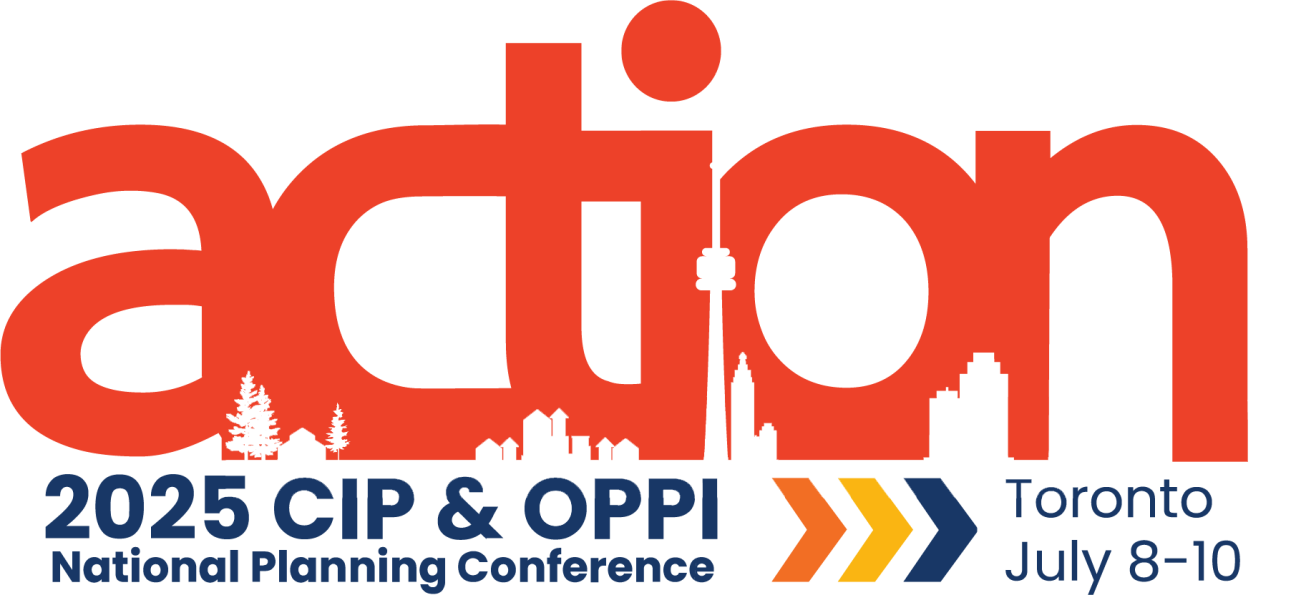Recognition
Canadian Awards for Planning Excellence 2025 Winners
Since 1983, these prestigious awards have celebrated the very best in Canadian planning. In 2025, CIP is excited to usher in a new era for the awards, offering a fresh perspective while staying true to its core purpose: recognizing excellence, creativity, and real-life impact.
The Canadian Institute of Planners (CIP) is proud to announce the winners of the 2025 Canadian Awards for Planning Excellence.
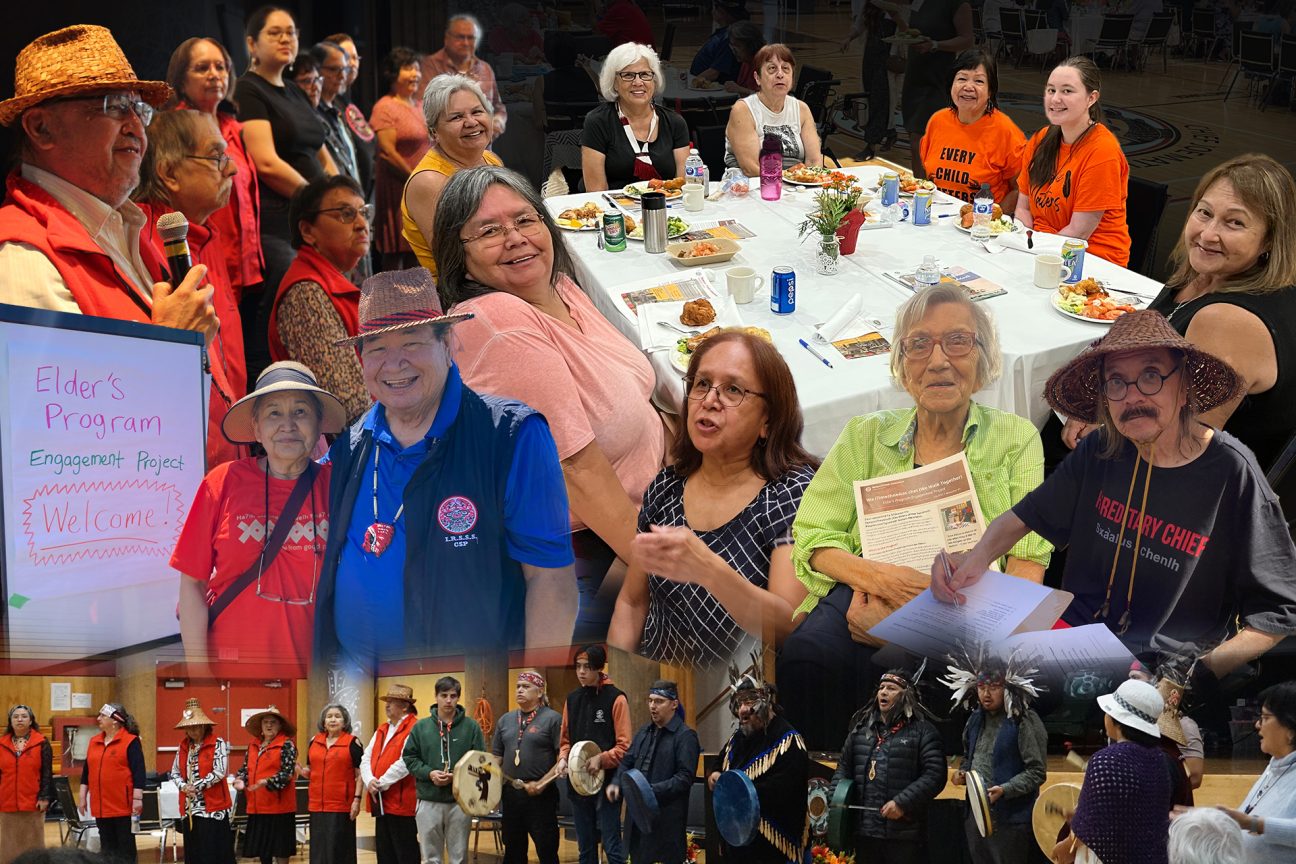

The Chet wa í7sun “We Pull Together:” Sḵwx̱wú7mesh Úxwumixw Elder’s Program Plan was developed to address the exclusion, isolation, and inequity faced by Elders, including those in care homes and living away from home. This Elder-led initiative reflects a culturally grounded, participatory process designed to prioritize healing, cultural authenticity, and community involvement. Over two years, more than 400 Elders aged 55+ contributed to shaping the plan, guided by the Xwí7ski (“Let’s Go!”) group in collaboration with Beringia Community Planning. The plan emphasizes decolonization, trauma-informed approaches, and strengthening Elder inclusion and decision-making, with implementation supported by Council approvals, budgets, and community collaboration.
Team members:
- Tselkwilem’t Byron Joseph
- Sisolia Donna Billy
- Lats-mat Mary Jane Natrall
- Sxwch’alten Kevin Rivers
- Wendy Lockhart Lundberg
- Sulseelsamat Gladys “Flo” Williams
- Sesaxwalia Aggie Andrews
- Barry Cordocedo
- Ketaxtenaat MJ Jacobs
- Mason Gamley
- Tsawaysia Dominique Nahanee
- Kw’x’aliya Josie Harry
- Thlee kul wut Monica Jacobs
- Sxwélhchaliya-t/ Tłaliła̱łg̱awe’ Jordan Ann Joseph
- Glenda Gibbon
- Samaya Jardey
- Bob Sokol
- Tlatlakwot Christine Baker
- Austin Chandler
- Yataltenat Kelley McReynolds
- Kate Kittredge
- Jeff Cook
- Paula Hay
- Lucie Neliba
- Justine Jordan
- Kiyúls Waylon Bo Baker
- Shawn Turgeon
- Celestino Silveira
- Laxelwet Evangeline Nahanee
- Sandra Jacobs
- Teresa Andrea Harry
- Jenny Guss
- Heather Spence
- H’wopey Gwen Baker
- Cyndi Baker
- Shanda Dosanjh
- Francis Baker
- Chanelle Lewis
- Jacinthe (Jazz) Gosselin
- Ruby Carrico
- Lesley Campbell
- Mackenzie Gomez
- Sharon Roling
- Susan Leon
- Bruno Marques
- Dana Bayne
- Laura Hillis


The City of Edmonton’s Zoning Bylaw Renewal Initiative modernizes zoning regulations to support housing diversity, affordability, and equity. This initiative simplifies zoning by reducing zones from 46 to 24, streamlining approvals and permitting up to eight dwellings on a standard lot. Innovative features include a “Small Scale Flex Residential Zone” with approval timelines as short as one day and the use of a Gender-Based Analysis Plus Toolkit to promote inclusive, equitable planning. City-wide rezoning, an improved online interface, and educational resources ensure a smooth transition. Early results show increased multi-dwelling housing approvals, meeting evolving community needs.
Team Members:
- Livia Balone RPP, MCIP
- Trevor Illingworth RPP, MCIP
- Christian Lee RPP, MCIP
- April Gallays RPP, MCIP
- Darbi Kinnee
- Jason Syvixay RPP, MCIP
- Calvin Chan RPP, MCIP
- Michelle Neilson RPP, MCIP
- Katherine Pihooja
- Samantha Buccino
- Robert Rutherford RPP, MCIP
- Arthur Poon
- Marco Beraldo
- Daniel Morin RPP, MCIP
- Alisa Oum
- Felipe Canavera RPP, MCIP
- Michelle Yip
- Stephen Cooke
- Jennifer Becker
- Monika Tulipan
- Beth Frigo
- Jennifer Renner
- Kalina Broda
- Michael Doyle RPP, MCIP
- Thomas Lippiatt, RPP, MCIP
- Jessy Inkpen
- Brandon Dyck
- Caroline Barlow
- Azure La
- Christine Lee RPP, MCIP
- Christine Lachance
- Amanda Sheehy
- Corina Ganton
- Gabrielle Donoff
- Georgina Campos
- Trevor Devlin
- Kenji Johnson
- Gabriella Dunn
- Claire Wasel
- Michael Withers
- Dustin Tanton
- Green Space Alliance
- Populus Community Planning Inc.
- Opticos Design Inc.
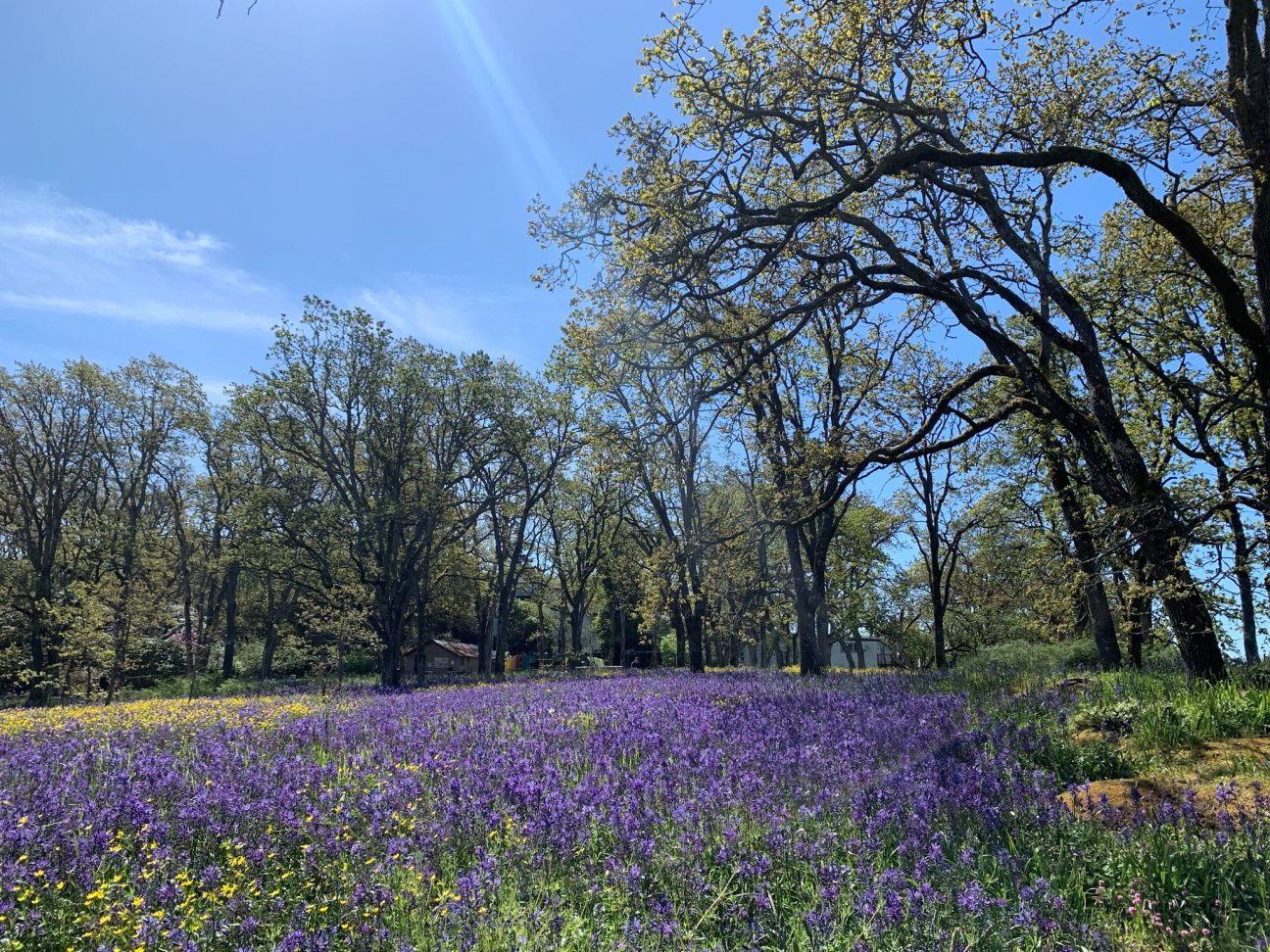

The District of Saanich recently developed two innovative strategies to strengthen the District’s climate resilience and protect its natural assets: the Biodiversity Conservation Strategy (BCS) and the Urban Forest Strategy (UFS). The BCS prioritizes protecting and restoring natural habitat, connecting ecological corridors, and enhancing ecosystem services. The UFS focuses on strengthening urban forestry practices, maintaining the District’s tree canopy and improving tree equity. These two strategies used advanced LiDAR and GIS technologies to develop accurate mapping and targets, and incorporated Indigenous knowledge through collaboration with the W̱SÁNEĆ Leadership Council. These strategies promote sustainable land use planning and community stewardship, and align with global biodiversity goals.
Team Members:
- Alison Kwan
- Matthew Shields
- Cassandra Cummings RPP, MCIP
- Amelia Needoba
- Mike Coulthard
- Aubrey Butcher
- Nguyet-Anh Nguyen
- Eva Riccius
- Nathalie Dechaine
- Alix Link
- Vlad Romanescu
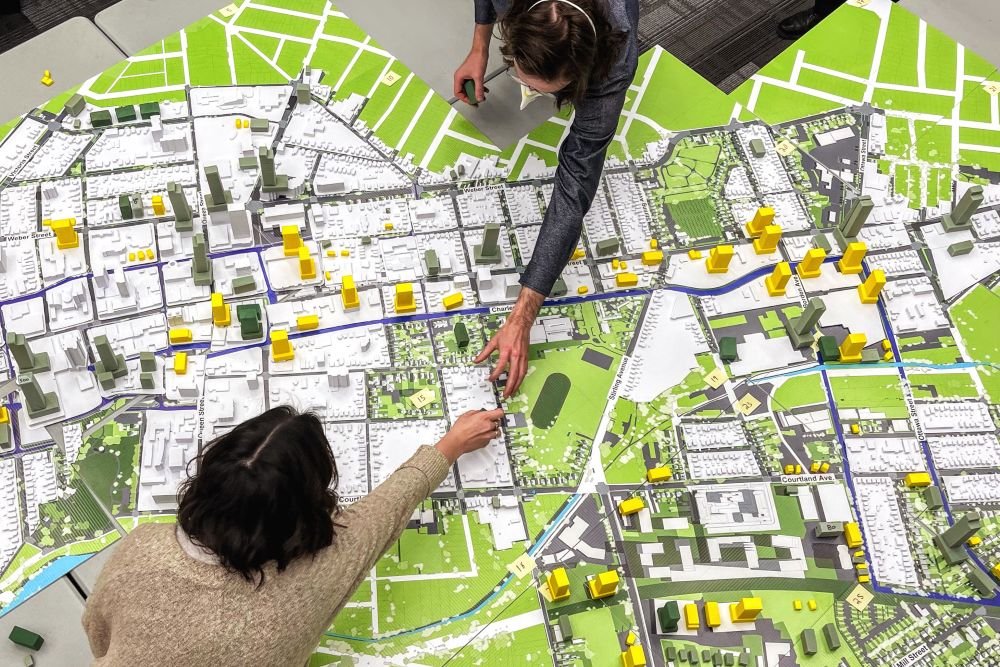

Growing Together is an equity-driven framework to transform Kitchener’s Major Transit Station Areas into vibrant, inclusive, and sustainable communities. It enables over 100,000 new homes, including 20,000 “missing middle” units and 4,500 affordable homes through inclusionary zoning. The plan eliminates parking minimums and density caps, introduces flexible zoning, and supports diverse housing types like multiplexes and purpose-built rentals. Innovative tools, including 3D-printed models, ensured community feedback shaped policy. By fostering mixed-use developments, aging-in-place options, and multigenerational housing, Growing Together advances Kitchener’s housing goals while setting a national standard for equitable, sustainable growth.
Team Members:
- Adam Clark
- Rosa Bustamante RPP, MCIP
- Natalie Goss RPP, MCIP
- John Zunic RPP, MCIP
- Richard Kelly-Ruetz RPP, MCIP
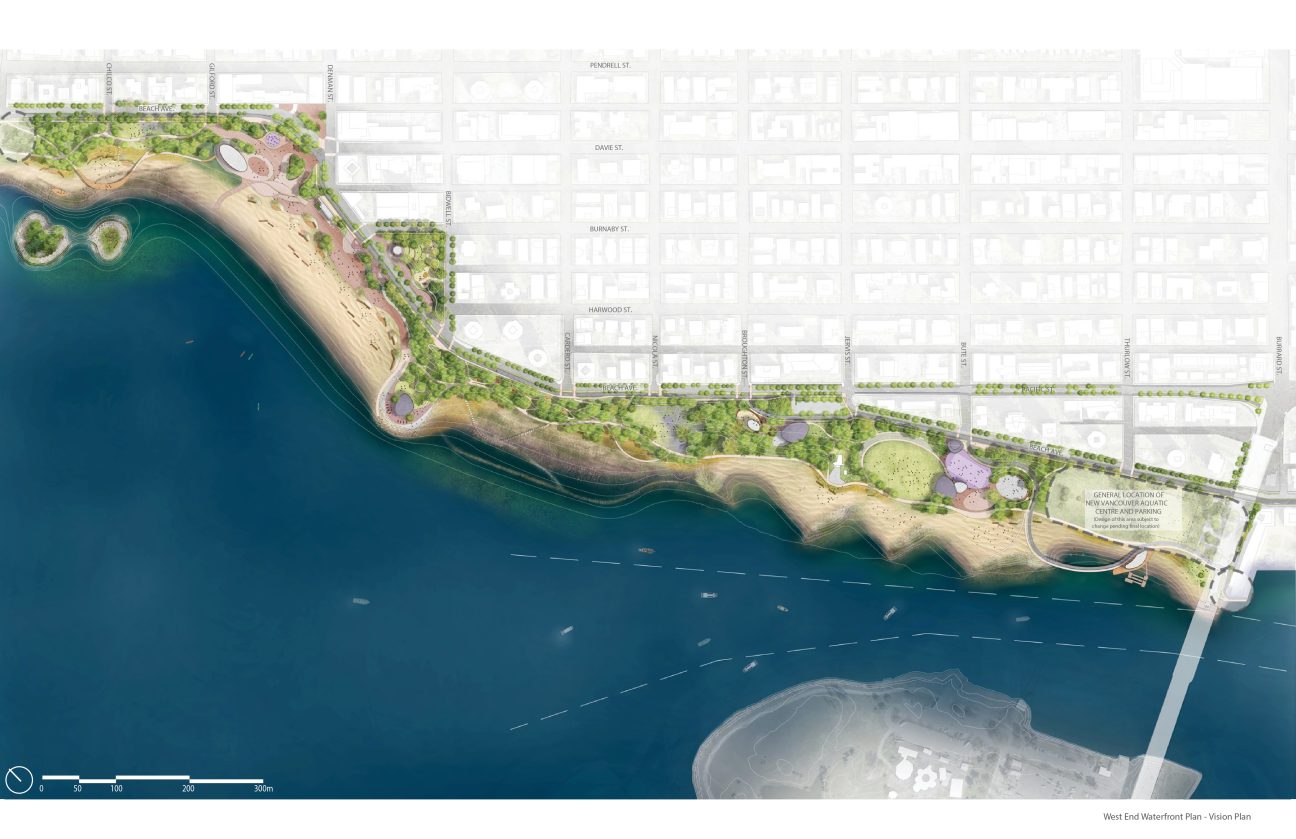

The Imagine West End Waterfront Vision Plan is a transformative 30-year strategy to address sea level rise, climate impacts, and population growth along Vancouver’s iconic West End Waterfront. Spanning Stanley Park to Burrard Bridge, the plan reimagines the waterfront with nature-based, climate-adaptive solutions like habitat islands, salt marshes, and terraced beaches. Centred on Truth and Reconciliation, it integrates Coast Salish Traditional Ecological Knowledge from the Musqueam, Squamish, and Tsleil-Waututh Nations. The plan emphasizes environmental restoration, cultural inclusivity, and equitable access, guiding the creation of resilient, interconnected urban parks that balance ecology, heritage, and recreation.
Team Members:
- Jordan McAuley
- Catarina Gomes RPP, MCIP
- Doug Shearer
- Tiina Mack
- Paul Storer
- Lindsay De Leeuw
- Kelty McKinnon
- Michelle Delk
- Nastaran Moradinejad
- Kate Larsen
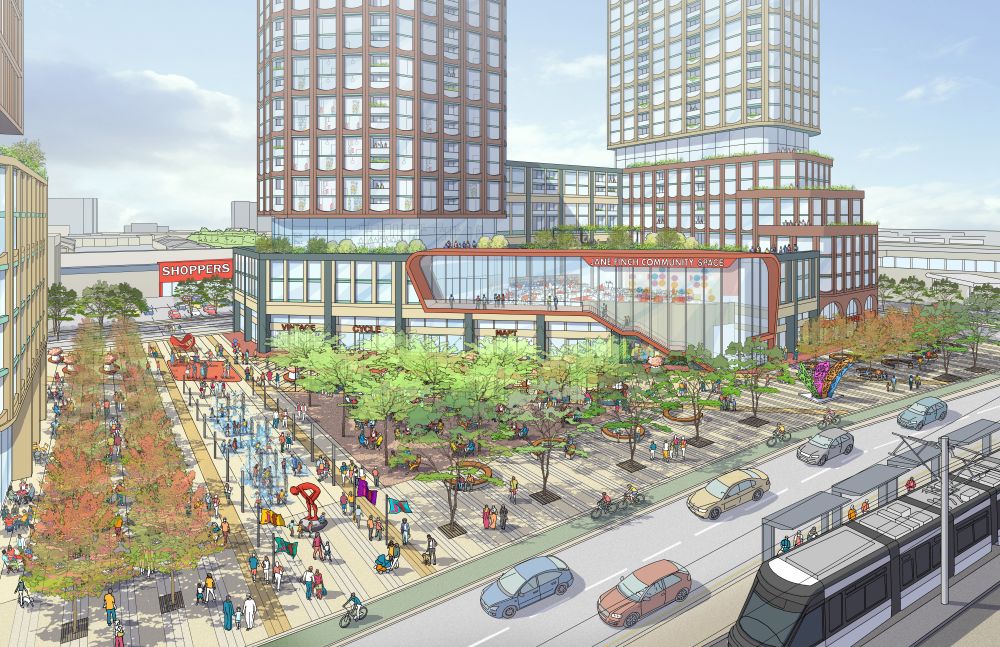

The jfm+ project is a progressive, private planning initiative for Jane Finch Mall, located in one of Canada’s most multicultural neighbourhoods. Led by Urban Strategies Inc. alongside a local engagement team, the two-and-a-half-year process established a long-term planning framework for the Mall Site that would benefit both existing and new community members by increasing density along the new Finch West LRT. Engagement with over 2,000 residents and 35 organizations shaped the plan prior to submission, ensuring historically excluded voices were heard and community benefits were prioritized and delivered early. This equity-centered approach sets a new standard for inclusive urban planning.
Team Members:
- Emily Reisman RPP, MCIP
- Craig Lametti RPP, MCIP
- Yasmin Afshar
- Maxine Cudlip
- Keisha St. Louis-McBurnie
- Shannon Holness
- Troy Budhu
- Stephanie A Lucas
- Carmen Smith
- Sean Meagher
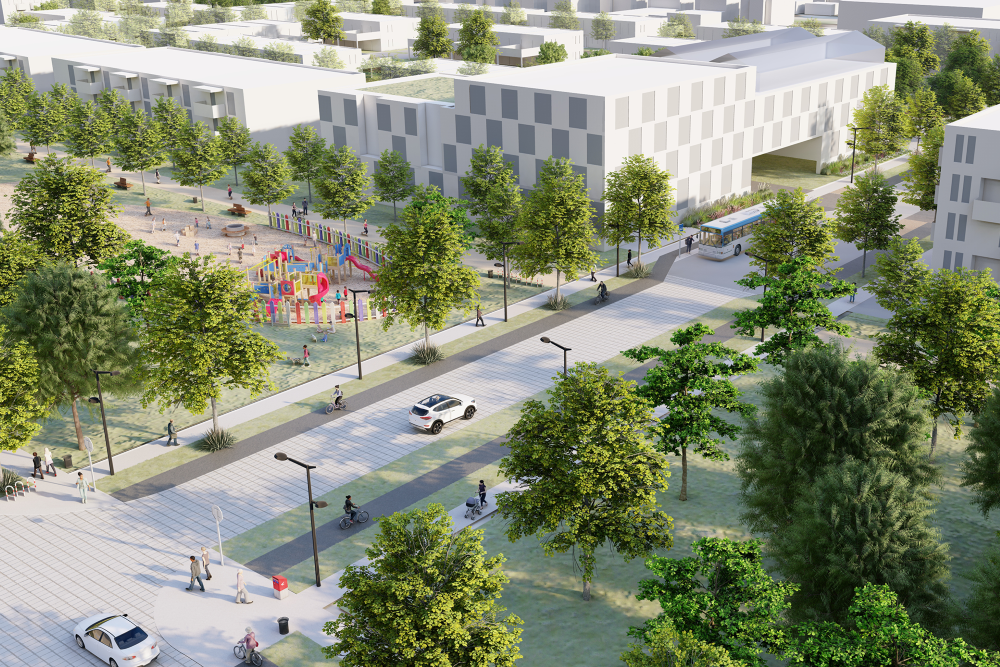

The Le Relais redevelopment plan in Trois-Rivières transforms a former industrial site into a sustainable neighbourhood. After the closure of the last factory in the Bas-du-Cap sector in 2008, leaving behind an 18.5 ha wasteland, the city initiated a public consultation and planning process. The plan integrates innovative design practices and emphasizes public participation, redefining the role of planners as facilitators of major urban projects. With a higher density than the surrounding area, the project aims to build 1,000 units, balancing urban consolidation with accessibility, quality of life, and financial sustainability for infrastructure and amenities.
Team Members:
- Louis-Michel Fournier-Renaud urbaniste
- Louis Mazerolle urbaniste, MCIP
- Marie-Eve Milot
- Joëlle Ouellette urbaniste, MCIP
- Paula Galeano
- Pamela Soto urbaniste
- Steven Hill Paquin
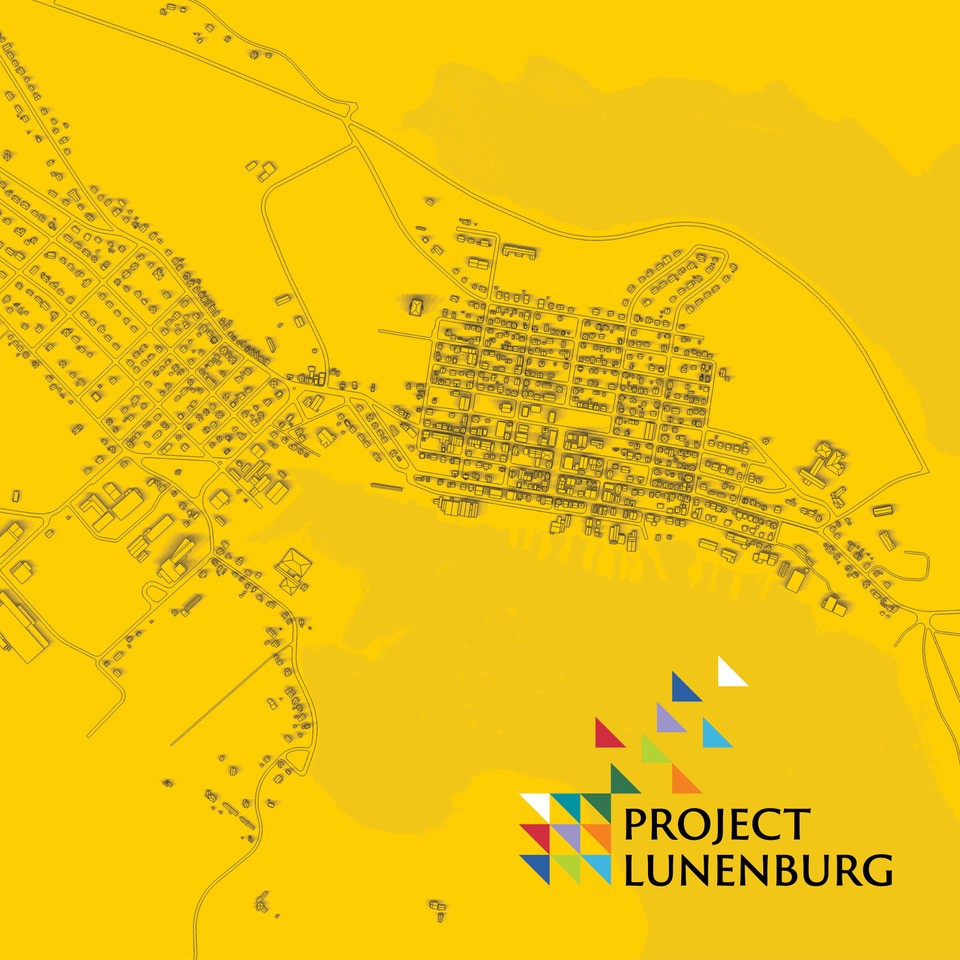

Project Lunenburg is a transformative planning initiative that developed a Comprehensive Community Plan (CCP), Municipal Planning Strategy (MPS), Land Use By-law (LUB), and Subdivision By-law (SUB) to shape the future of Lunenburg, a UNESCO World Heritage town. The project balanced the preservation of Lunenburg’s historical character with modern needs for housing, transportation, and environmental sustainability. Through an 18-month engagement process, over 400 community members contributed to a shared vision for the town’s future. A key innovation was the introduction of a modular zoning system that simplifies planning by applying Lot, Use, and Form Zones to each property, allowing for nuanced and flexible land use. This initiative has set the stage for future projects that align with the community’s values and long-term objectives, ensuring inclusive, sustainable development for the future.
Team Members:
- Steffen Kaeubler LPP, MCIP
- Ian Watson LPP, MCIP
- Bruce Mans LPP, MCIP
- Paul Dec LPP, MCIP
- Erica Brook
- Juniper Littlefield
- Kevin Cooper
- Neil R. Lovitt LPP, MCIP
- Wendy Shearer
- Emanuel Nicolescu LPP, MCIP
- Jason Genée RPP, MCIP
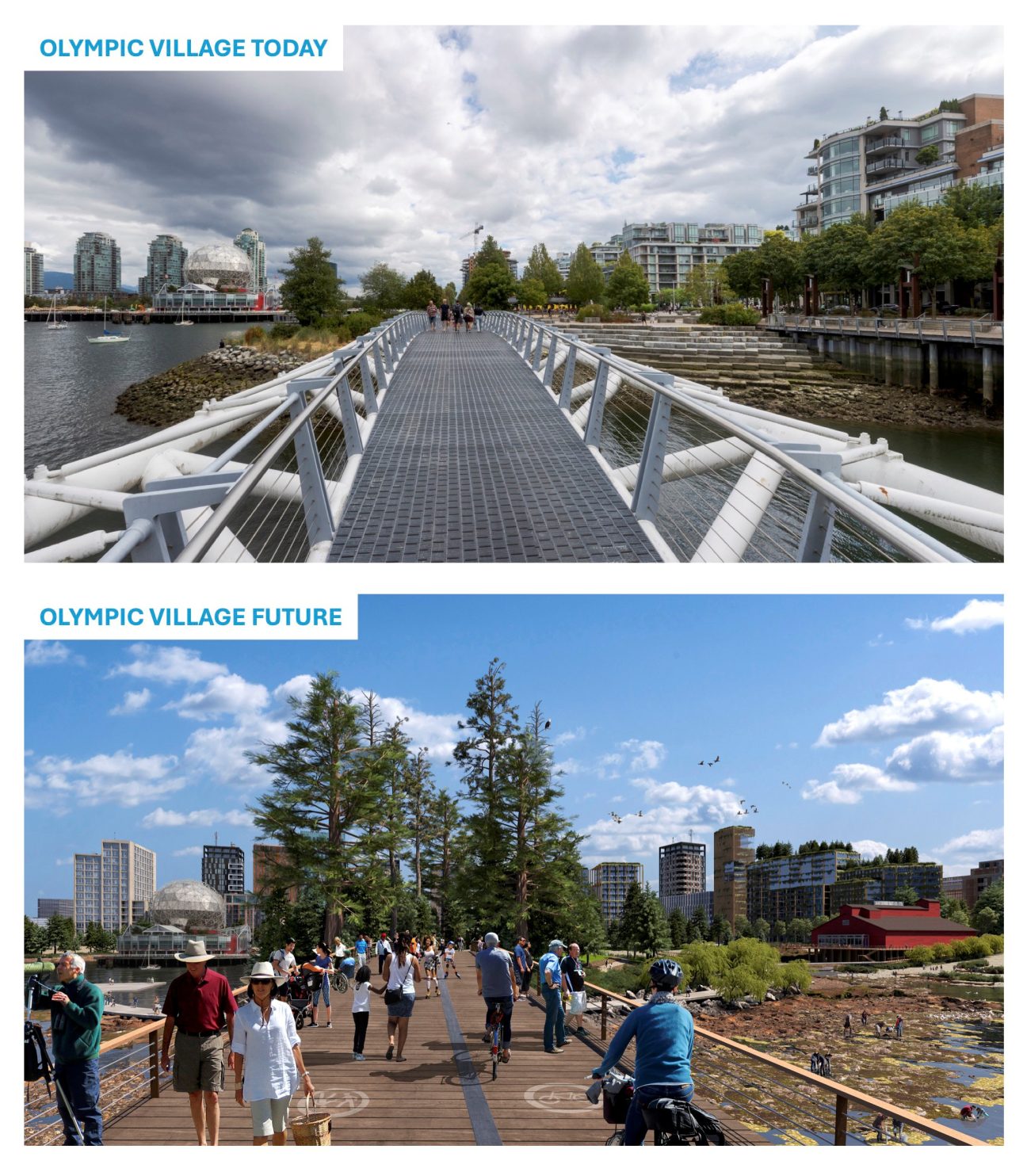

Sea2City was an innovative collaborative planning and design competition to rethink the future of Vancouver’s False Creek to adapt to rising sea levels while accommodating urban development and supporting ecological revitalization. The project fostered a collaborative, decolonized approach to planning, engaging two international multidisciplinary teams, City staff, local experts, and local First Nations (Musqueam, Squamish, Tsleil-Waututh). A bold vision for the beloved waterfront was crafted with extensive community engagement and was supported with a detailed adaptation pathway and planning tools to help realize it. Two Sea2City pilot projects are currently underway that are testing new approaches to more resilient coastal development.
Team Members:
- John Ingram RPP, MCIP
- Angela Danyluck
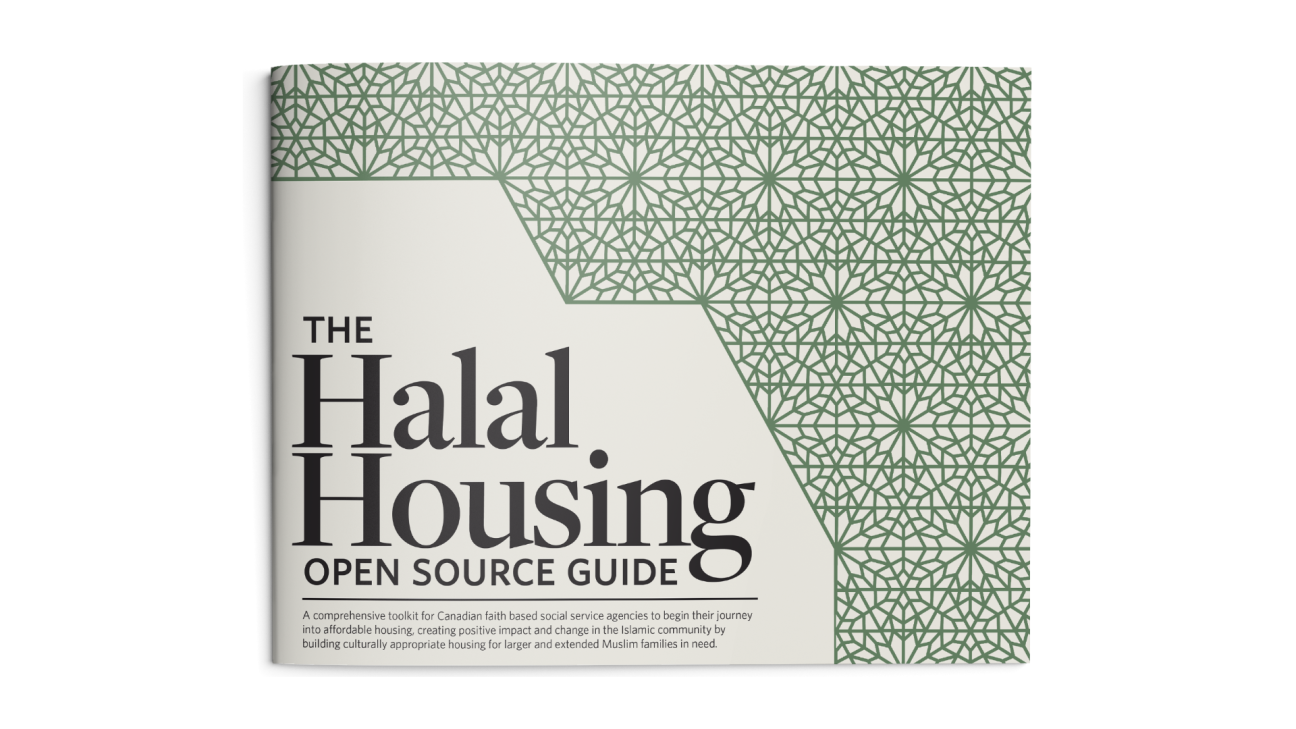

The Halal Housing Lab addresses the urgent need for affordable, culturally appropriate housing for Muslim families in Canada, particularly larger and multigenerational households. Integrating Islamic design principles, Shariah-compliant financing, and holistic development principles, the project developed scalable models that reflect Muslim values while meeting industry standards. Over 18 months, the Lab collaborated with the Muslim community and industry experts, securing a site in Edmonton, creating replicable housing and financing frameworks, and launching an Open-Source Guide. This work demonstrates how culturally inclusive housing solutions can strengthen communities and provide innovative approaches to meet diverse needs across the country.
Team Members:
- John Lewis RPP, MCIP
- Jay Heule
- Alastair Wycliffe-Jones
- Omar Yaqub
- Lena Awwad
- Anna Bubel
- Sherri Shorten
- Shafraaz Kaba
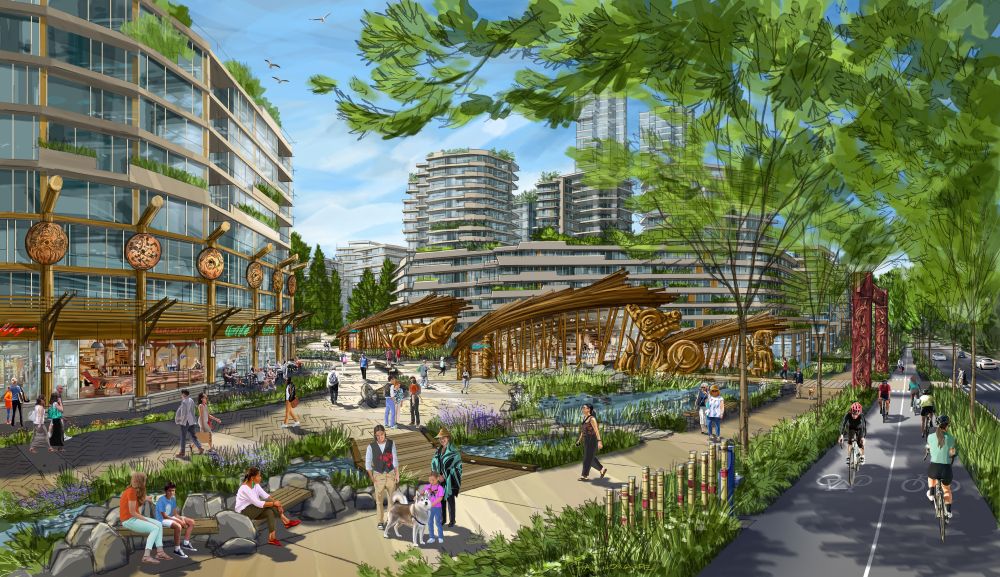
The ʔəy̓alməxʷ/Iy̓álmexw/Jericho Lands project is a transformative 90-acre redevelopment in Vancouver, guided by the cultural values of the xʷməθkʷəy̓əm (Musqueam), Sḵwx̱wú7mesh (Squamish), and səlílwətaɬ (Tsleil-Waututh) Nations. With plans to house 13,000 households, the project integrates Indigenous knowledge, prioritizing cultural expression, sustainability, and inclusivity. Key elements include honouring the land and water, and recognizing the site as an important place of gathering. The development will offer diverse housing, public spaces, and community amenities, all while delivering affordability, prioritizing active transportation, and celebrating xʷməθkʷəy̓əm, Sḵwx̱wú7mesh, and səlílwətaɬ cultures through collaborative planning
Team Members:
- Sxeláltenaat – Adrienne Charlie
- Charleen Grant
- Whonoak – Dennis Thomas
- Ts’kanchtn – Calvin Charlie-Dawson
- Hunas – William George Thomas
- Brennan Cook
- Elisa Campbell
- Matt Shillito
- Melanie Hare RPP, FCIP
- Michel Trocmé
- Sirous Ghanbarzadeh
- Chris Philips
- Tatjana Trebic RPP, MCIP
- Emory Davidge
- Kelty McKinnon
Thank you to all who submitted applications and to the esteemed Canadian Awards for Planning Excellence Jury. The official awards presentation will take place at ACTION 2025, Canada’s largest planning conference hosted by CIP and the Ontario Professional Planners Institute in Toronto, on July 9, 2025.
